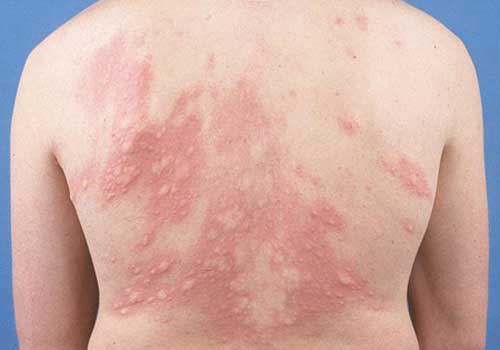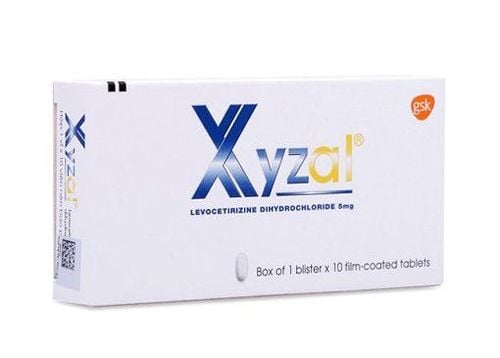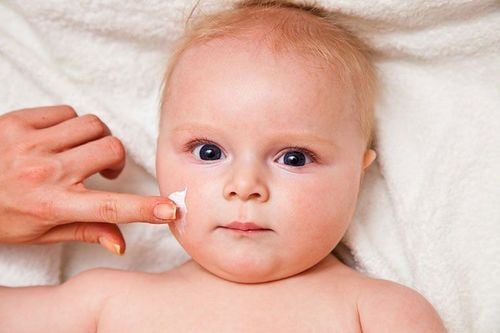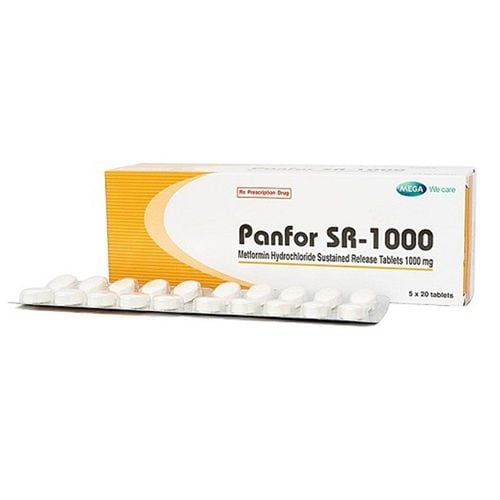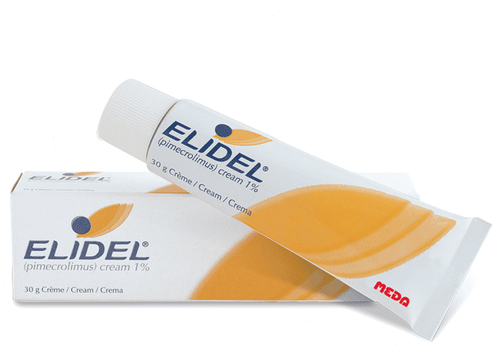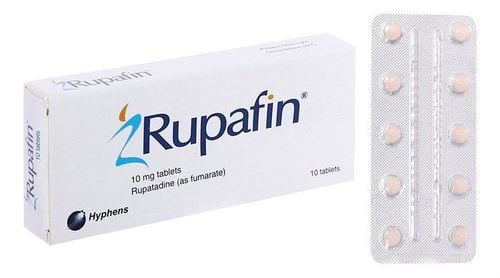This is an automatically translated article.
Choline urticaria is usually not dangerous and can go away on its own, but in some cases, choline urticaria can persist and recur continuously. If not treated promptly with appropriate measures, the disease can lead to complications, serious allergies, and life-threatening anaphylaxis.
1. What is choline urticaria?
Choline urticaria is a form of skin rash, also known as acute choline urticaria. Choline urticaria occurs because the skin reacts to acetylcholine, which is a mediator that acts as a neurotransmitter to control the dilation of blood vessels and slows the heart rate. Cholinergic urticaria usually occurs in people who have a very hot body temperature or sweat a lot.
Choline urticaria will disappear immediately without treatment, but it can also be persistent, relapsing continuously and complicate into chronic choline urticaria. Choline urticaria is divided into 4 main types:
Choline urticaria caused by sweat allergy Choline urticaria caused by clogged pores Choline urticaria due to spontaneous causes Choline urticaria due to reduced sweating
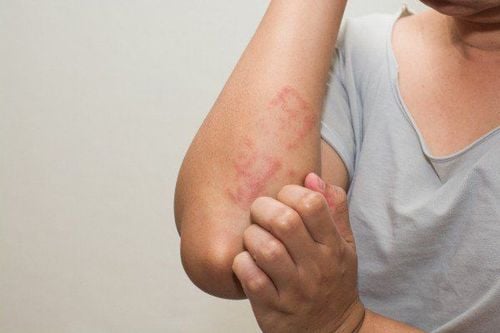
Mày đay do cholin nguyên nhân do dị ứng mồ hôi
2. Causes of urticaria due to choline
The exact cause of choline urticaria is currently unknown. However, there are some factors that contribute to choline urticaria such as:
Excessive sweating: This is one of the most common causes of choline urticaria. The cause may be due to hot tub bath, exercise, in a place with high temperature, sauna, high fever, eating a lot of spicy food... Temperature: the two main forms of heat loss of the body are direct heat transfer. from the body to the environment or excrete and sweat, but if there is a change in the temperature outside and inside, the heat loss process will be affected leading to choline urticaria. Parasitic infections: When infected with parasites such as flukes, worms, ... they will follow the bloodstream and move to internal organs and other locations in the body. At that time, the body will produce protective active substances. This is the cause of skin allergies and choline urticaria. Side effects of medications: Certain antibiotics and anti-inflammatory drugs can increase the risk of choline urticaria.

Một số loại thuốc kháng sinh, chống viêm có thể tăng nguy cơ mắc bệnh mày đay do cholin.
3.Symptoms of urticaria due to choline
Symptoms of choline urticaria are hives, swelling for about 5-6 minutes after you exercise, or other triggers. This can be aggravated by the following:
Itchy skin and a red rash around the bump Hives with small, swollen bumps on the surface of the skin Hives can appear all over the body, However, it usually starts on the chest and neck, then the swelling, skin rash will spread to other areas of the body. This can last from a few minutes to several hours, depending on the person. Some other symptoms may accompany such as: Abdominal pain, nausea and vomiting, increased salivation. Some people have severe reactions, such as difficulty breathing, palpitations, or stomach cramps. Choline urticaria is usually not dangerous and can go away on its own. But in some cases, choline urticaria can persist, recur continuously. If not treated promptly with appropriate measures, it can lead to complications, serious allergies, and life-threatening anaphylaxis.
In addition, choline urticaria often causes many inconveniences and difficulties for people who regularly practice sports such as athletes,... Therefore, when there are symptoms of choline urticaria, good Most patients should visit specialized facilities for examination and advice on the most appropriate and safest treatment regimen.
4. How to treat choline urticaria?
Cholinergic urticaria will disappear immediately without treatment, but it can also be persistent, relapsing continuously and complicate into chronic choline urticaria. Treatments for choline urticaria include medication, lifestyle changes, and proper nutrition. The specific treatment methods are as follows:
Using drugs to treat choline urticaria: Some antihistamines are a group of drugs commonly used to prevent and treat choline urticaria. In addition, medication to control sweating such as methantheline bromide or montelukast may be required. Use beta-blockers, immunosuppressants, and UV rays to treat choline urticaria. In the case of exercise-induced anaphylaxis, Epipen may be indicated for use if symptoms appear. Or use anti-allergic, moisturizing creams to minimize itching and redness. However, the drugs to treat urticaria caused by choline all need a prescription from a specialist, the patient must not buy it on their own. Limiting triggers: This method means changing lifestyle, avoiding factors that trigger urticaria for the patient. Specifically, patients should avoid exercising, taking hot baths, consuming hot spicy foods, and avoiding prolonged exposure to high temperatures. In addition, stress and pressure are the causes of choline urticaria, so patients should reduce and control stress, instead should listen to music, practice yoga or do what they like. Building a diet: Apply a low-histamine diet to help limit chronic choline urticaria. Because histamine is a chemical involved in the body's allergic response. This diet is achieved by reducing or avoiding foods such as vinegar, alcohol, nuts, salty foods, dairy products, fish and shellfish, foods that are high in preservatives. or additives. In the case of choline urticaria, you can use a common home remedy for choline urticaria such as bathing with star fruit leaves, using crushed perilla and then extracting the juice to drink.
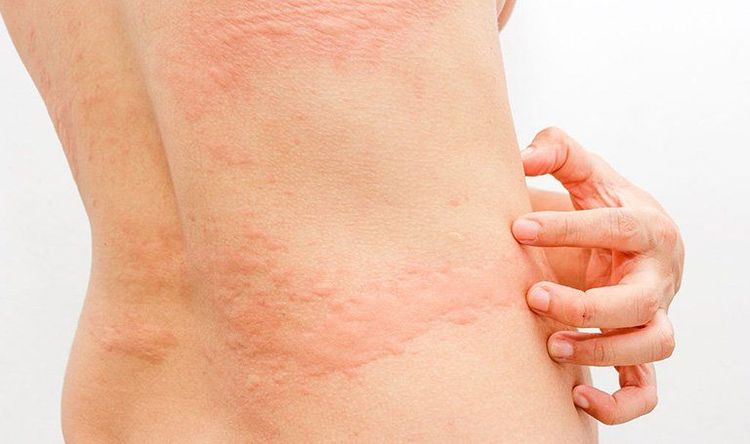
Mày đay cholinergic sẽ biến mất ngay sau đó mà không cần đến việc điều trị, nhưng nó cũng có thể kéo dài dai dẳng
Vinmec International General Hospital with a system of modern facilities, medical equipment and a team of experts and doctors with many years of experience in medical examination and treatment, patients can rest assured to visit. examination and treatment of choline urticaria at the hospital.
Please dial HOTLINE for more information or register for an appointment HERE. Download MyVinmec app to make appointments faster and to manage your bookings easily.
SEE MORE
Is urticaria contagious and will it go away on its own? Urticaria during pregnancy and postpartum: What you need to know Find out what causes hives




